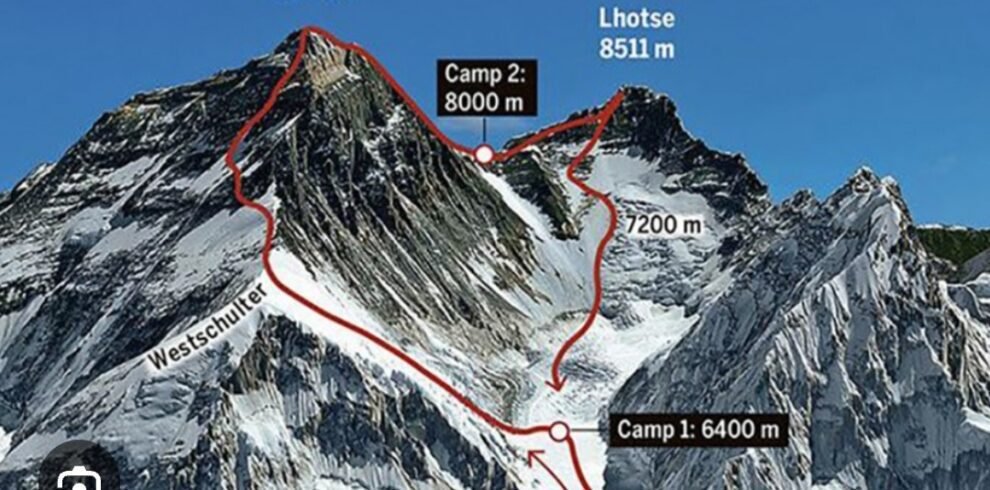Lhotse lies about 3 km south of Mount Everest, separated by the South Col. In fact, Lhotse means South Face. Three peaks that make up the Lhotse massif are: Lhotse East or middle, Lhotse Shar and Lhotse. Immediately south of Mount Everest lies the long east-west crest, and the summits of the two mountains are connected by the South Col. South Face of Lhotse is the most technical face of Lhotse. The Lhotse South Face is also one of the largest mountain faces in the world. The section during the climb, which has been unanimously declared the most dangerous, is the Khumbu Icefall. Both Mt Everest and Lhotse share the same base camp. In fact, Lhotse is a part of Everest massif itself.
However, Lhotse is considered to be an independent mountain. After several unsuccessful attempts, the South Face was successful climbed only in 1984. This beautiful massif also holds immense promise as it is little developed and offers fascinating opportunities. Lhotse can be climbed either from Everest Base Camp or nearby Chhukung. Being an 8,000er, the Lhotse Expedition encounters many obstacles including high altitudes, harsh weather conditions and even sheer exhaustion. We believe our planning, logistics, staffing and experience coupled with your enthusiasm, patience, and perseverance would help you achieve your lifetime dream. We strive hard to conduct the best expedition program at a fair price.
Upon your arrival in the Tribhuvan international airport, our representative will welcome you and will assist to transfer you in your hotel in Kathmandu. You may relax at your hotel or go around for shopping. In the evening Himalayan Glacier Trekking will organize welcome dinner for you in a centrally located Nepalese restaurant while briefing about your adventurous trip will take place. Overnight at hotel.
Sightseeing and Preparation for Everest Expedition. While the leader attends a formal briefing in the Ministry of Tourism, you will explore the fascinating city of Kathmandu. You will visit famous Stupa, Boudhnath and the popular Hindu pilgrimage site, Pashupatinath Temple. In the late afternoon, the leader will check everyone’s equipment, as Kathmandu is the last opportunity to buy anything missing. You will also get introduced with fellow expedition members and guides. Overnight at hotel.
An early morning scenic flight to Lukla. In Lukla, we will meet our camp staff and porters and set off straightaway for our first night’s stop at Phakding. Situated on the banks of the Dudh Kosi which drains the whole of the Khumbu region, Phakding on the main trade route through the area and there are a number of clean well-built lodges where we can spend the night.
Continue up the banks of the Dudh Kosi, crossing it twice by small suspension bridges before reaching the village of Monjo where we will enter the Khumbu National Park. Cross the confluence of the Dudh Kosi and the Bhote Kosi on a high suspension bridge and climb steeply for about two hours to reach Namche Bazaar. This is a prosperous trading town and the capital of the Khumbu region with genuine Tibetan artifacts.
We spend a day in Namche Bazar resting and allowing our bodies to become acclimatized to the altitude of 3,450m (11,300ft).
The well worn Everest trail contours around the side of the valley high above the Dudh Kosi. Follow the path, savoring the first really good views of the great peaks of the Khumbu: Everest, Lhotse, Nuptse and Ama Dablam. Passing by several villages and numerous tea shops, cross the Dudh Kosi River and make a steep climb to Thyangboche, home of an impressive and newly rebuilt monastery.
Shaded by rhododendron trees, the path leads gradually down to the river once again to another airy suspension bridge. An hour’s walking from here brings us to Pangboche, an excellent viewpoint for Ama Dablam. Contouring up the valley side, re-cross the river and turn up the Imja valley to reach the picturesque farming village of Dingboche.
This is an important phase of the expedition. Dingboche is a good location for acclimatization. The team leader will organize daily outings to the adjacent hills with the aim of providing gradual acclimatization. Walk some of the nearby hills in order to slowly increase exposure to altitude. Follow the regime that you have previously found most suitable, in order to give you maximum acclimatization before arrive in base camp.
While in Dingboche, we can attend a seminar on high altitude acclimatization at a hospital run by the Himalayan Rescue Association nearby Pheriche. The walk over to Pheriche and back will also serve as good acclimatization training.
Climbing period of Lhotse and Back to Base Camp
Trek to Namche Bazaar via Dingboche and Thyangboche
Trek to Phakding and Lukla
We will return to the welcome haven of the Hotel. Once back in Kathmandu, Himalayan Glacier will host an evening barbecue to celebrate the expedition and as a farewell party to thank the Sherpas for their support and friendship.
Today the journey comes to an end. There’s nothing to do but trade emails with your new friends, organize all your photos and final preparation for departure from Nepal.
Departure to your next destination

